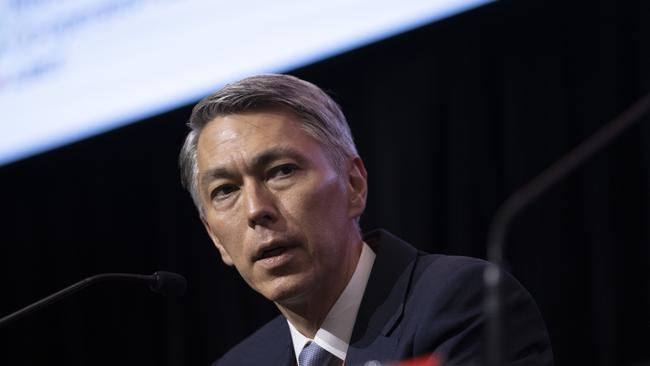BHP calls for policy clarity to keep foreign investment rolling in
BHP boss Mike Henry says Australia must find an appropriate policy balance to ensure the country remains an attractive investment destination for its key trading partners.

BHP boss Mike Henry said Australia must provide stronger policy settings to ensure Japan maintains resources investment amid broader concerns over a fraying of the economic relationship between the two nations.
The head of the world’s biggest mining company said an appropriate balance needed to be found to ensure important trading partners like Japan continued to spend in Australia.
“I do know that often times you can be like-minded at the policy level, but still not see that translated into practical changes on the ground. So I think at a minimum, there needs to be real clarity and dialogue between policymakers in Japan and in Australia,” Mr Henry told the Australia Japan Business Co-operation Committee 60th Annual Joint Business Conference in Melbourne on Monday.
“So not just high-level support for free trade and so on, but practically what are the policy settings required in Australia for Japan and Japanese industry to be making ongoing investments in Australia. What’s going to make Australia a more attractive trading partner, investment destination, than the other options that Japanese companies have available to them elsewhere?”
The former Japanese ambassador to Australia, Shingo Yamagami, warned in a departure interview in April that “sovereign risk” is now an active concern among Japan’s corporates and energy companies which fear the reliability of Australia as an energy supplier.
It followed Japanese LNG giants Inpex and Tokyo Gas cautioning against policy shifts that could undermine the nations’ vital energy partnership as the Albanese government tightened LNG export controls.
Tokyo also sounded the alarm on the Queensland Labor government’s tax regime for coalminers along with the NSW government’s coal reservation scheme.
BHP also called for better alignment on critical minerals given their different naming and branding across countries.
“I go to Washington people talk about critical minerals, in Tokyo and Europe, but often times we’re speaking a different language. The critical minerals listed in Japan will be different than the critical minerals in Australia, will be different than critical minerals listed in the US,” Mr Henry said.
“And the more that can be done to align critical minerals lists – so that we all know which metals and minerals require the greatest focus and investment on the part of governments and industry – which require the greatest level of research and development, the more efficient the system is likely to operate in finding the solutions that we need to find and to incentivise the investments that are required for us to shore up the reliability and efficiency of critical mineral supply chains.”
Federal Resources Minister Madeleine King said earlier this year the Albanese government was still pushing for a bigger place for Australian critical mineral miners in US President Joe Biden’s $US500bn Inflation Reduction Act.



